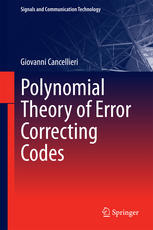

Most ebook files are in PDF format, so you can easily read them using various software such as Foxit Reader or directly on the Google Chrome browser.
Some ebook files are released by publishers in other formats such as .awz, .mobi, .epub, .fb2, etc. You may need to install specific software to read these formats on mobile/PC, such as Calibre.
Please read the tutorial at this link: https://ebookbell.com/faq
We offer FREE conversion to the popular formats you request; however, this may take some time. Therefore, right after payment, please email us, and we will try to provide the service as quickly as possible.
For some exceptional file formats or broken links (if any), please refrain from opening any disputes. Instead, email us first, and we will try to assist within a maximum of 6 hours.
EbookBell Team

5.0
50 reviewsThe book offers an original view on channel coding, based on a unitary approach to block and convolutional codes for error correction. It presents both new concepts and new families of codes. For example, lengthened and modified lengthened cyclic codes are introduced as a bridge towards time-invariant convolutional codes and their extension to time-varying versions. The novel families of codes include turbo codes and low-density parity check (LDPC) codes, the features of which are justified from the structural properties of the component codes. Design procedures for regular LDPC codes are proposed, supported by the presented theory. Quasi-cyclic LDPC codes, in block or convolutional form, represent one of the most original contributions of the book. The use of more than 100 examples allows the reader gradually to gain an understanding of the theory, and the provision of a list of more than 150 definitions, indexed at the end of the book, permits rapid location of sought information.